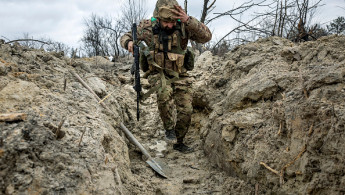Ukraine claims gains despite Russia 'powerful resistance'
Kyiv on Thursday reported 'progress' in its counteroffensive on the eastern and southern fronts, despite contending with strong resistance from Russian troops.
The chief of the UN's atomic watchdog arrived in the southeastern region of Zaporizhzia - home to Europe's largest nuclear plant and one of the current fronts - to assess risks to the site following the destruction of a major dam.
His visit came as Kyiv, bolstered with Western weapons and training, pushed its long-awaited effort to force Russian troops off its territory.
AFP journalists saw Ukrainian artillery continue to target Russian positions around the frontline hotspot of Bakhmut, in the eastern Donetsk region.
Moscow claimed victory in Bakhmut last month after the longest battle of the war that claimed thousands of lives and left the city in ruins.
"The enemy is pulling up additional reserves and is trying with all its might to prevent the advance of Ukrainian forces," Ukrainian Deputy Defence Minister Ganna Malyar told a briefing.
Malyar reported an advance of more than three kilometres (1.8 miles) in the area of Bakhmut over the past ten days.
Since the start of the offensive in early June Ukrainian forces have recaptured seven settlements and more than 100 square kilometres (under 40 square miles) of territory, said Oleksiy Gromov of the Ukrainian armed forces' general staff.
'Steady advance'
"There is a gradual but steady advance of the armed forces" in the south, Malyar told reporters.
"At the same time, the enemy is putting up powerful resistance" on the southern front, she said, referring to mined fields, explosive drones and intense shelling.
Russia said it had repelled all Ukrainian assaults, with President Vladimir Putin this week claiming that Ukraine suffered near "catastrophic" losses.
The region of Zaporizhzhia, where fighting has stepped up, is home to the Zaporizhzhia nuclear power plant.
Its safety has been a major concern ever since Russian forces seized it more than a year ago, but the destruction of a nearby dam has sparked new fears.
The Russian-held Kakhovka dam, destroyed last week in an attack Kyiv and Moscow blamed each other for, formed a reservoir that provided the cooling water for the plant.
UN nuclear chief Rafael Grossi arrived at the plant on Thursday to assess any damage there, a Russian official said.
Grossi, head of the International Atomic Energy Agency, was initially expected to tour the site Wednesday.
"I want to make my own assessment," Grossi said during a briefing in Kyiv this week.
"I want to go there, discuss with the management there what measures they are taking, and then make as I said a more definitive assessment of what kind of danger we have."





 Follow the Middle East's top stories in English at The New Arab on Google News
Follow the Middle East's top stories in English at The New Arab on Google News


